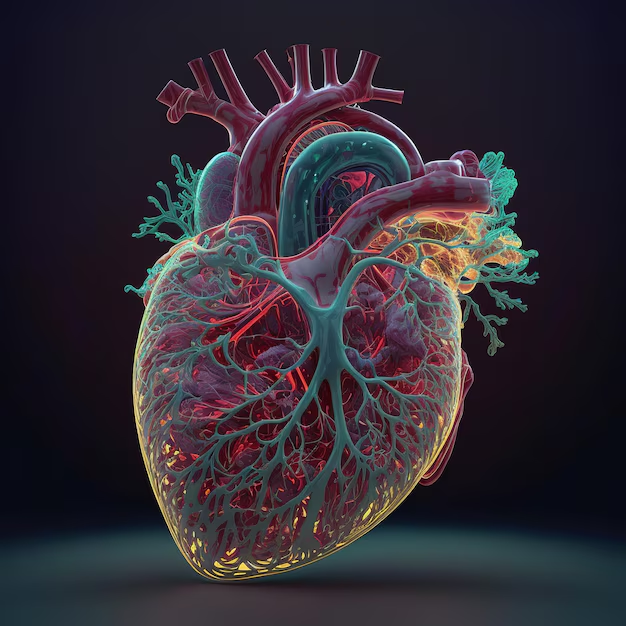Adverts
The heart is one of the most fascinating and tireless organs in the human body. It works tirelessly, beating around 100,000 times a day to keep the blood circulating and sustain all vital functions.
Over the course of a lifetime, especially if we reach 70 years of age, this small muscle performs something extraordinary: approximately 2.5 billion beats! 🫀
Adverts
Behind this impressive number, there are interesting and surprising facts that show how essential and unique the heart is.
In this content, we will explore how it works, the importance of taking care of cardiovascular health and even some data that will leave you speechless about the capacity of the human heart.
Adverts
Understanding the heart’s journey throughout life is more than just a matter of curiosity. It’s an opportunity to reflect on how healthy habits can directly impact your longevity and well-being.
After all, every beat counts. ❤️
Get ready to dive into a fascinating universe about the organ that silently sustains every second of our existence!
Recommended Articles:

Your heart: the most amazing machine you've ever owned
Have you ever stopped to think that inside your chest lives a real biological machine, which has been working non-stop since the day you were born? Well, the heart is basically the engine that keeps everything running. And the most impressive thing is that, over the course of an average life of 70 years, it will beat approximately 2.5 billion times! It seems surreal, right? 🤯
Now think about it: this organ, which weighs about 300 grams (almost the weight of a can of soda), is capable of pumping blood to every corner of your body. That's 5 liters of blood per minute, which is approximately 7,200 liters per day. Is that good enough or do you want more? Each beat is a reminder that you're alive, and each cycle is a masterpiece of biological efficiency.
The craziest thing is that, despite all this activity, we almost never stop to think about the tireless work that our hearts do. It's like that coworker who solves everything without drawing attention to himself, you know? Always there, firm and strong, keeping us going even on the most tiring days.
How much effort does this mean?
If you’re not a fan of numbers, let me give you a practical overview: in a 70-year life, the heart will have pumped about 200 million liters of blood. That’s enough to fill 80 Olympic-sized swimming pools! And you know what’s even cooler? It does this without needing any “maintenance” — of course, as long as you take good care of it with a balanced diet, exercise, and medical monitoring.
Another interesting fact: while you're reading this, your heart has already beaten at least 200 times (if we consider an average of 70 beats per minute). You can feel the responsibility of this little power plant, right?
- Speed: The heart is fast and efficient, taking only about a minute for blood to circulate throughout the body.
- Resistance: He never “takes a vacation” — even when you’re sleeping, he’s hard at work.
- Power: Each heartbeat generates enough pressure to spray blood up to 10 meters away.
If this doesn't blow your mind, I don't know what will! 🫀✨
Why does the heart beat so much?
Okay, now you know that the heart is an incredibly efficient machine, but you might be wondering: “Why does it need to beat so many times throughout your life?” The answer lies in its essential function: distributing oxygen and nutrients throughout your body. Each beat is a mini “delivery of a package” to your cells. Without it, nothing in your body would work properly.
The role of oxygen in the heart cycle
When you breathe, oxygen enters your lungs, passes into your bloodstream, and is transported by your heart to every part of your body. This is essential for keeping your cells alive and functioning. In return, they release carbon dioxide, which your heart helps carry back to your lungs for elimination. This cycle happens thousands of times a day, and if your heart stops, everything stops with it.
Another interesting fact worth mentioning is that the human heart is adapted to respond quickly to the body's needs. Climbing stairs? It speeds up. Sleeping? It slows down. This happens because it is controlled by a natural electrical system called the "sinoatrial node", which acts as an internal pacemaker. Cool, right? ⚡
- Beats faster when: You exercise, feel strong emotions, or have a fever.
- It beats slower when: You are relaxed, sleeping or practicing meditation.
- Extra curiosity: An athlete's heart may beat fewer times per minute at rest because it is more efficient.
How to take care of your “machine” to reach those 2.5 billion beats?
Okay, now that you know how essential the heart is and how hard it works, an important question arises: what can you do to ensure that it reaches those 2.5 billion beats (or more) strong and steady? 🏋️♀️
Healthy habits make all the difference
If there’s one thing that can make a difference in how your heart works, it’s your daily habits. There’s no point in expecting it to last 70 years if you don’t give it the attention it deserves. Here are some practical tips you can start applying today:
- Eat well: Include more fruits, vegetables, whole grains and sources of healthy fats (such as avocado and olive oil) in your diet. Avoid ultra-processed foods and excess salt, as they increase blood pressure.
- Practice exercises: You don't have to become an athlete, but taking a 30-minute walk a day can do wonders. Your heart loves to move!
- Sleep well: Quality sleep is essential for the body's recovery and also for keeping the heart rested.
- Control stress: Constant anxiety and nervousness can cause blood pressure spikes and put a strain on the heart. Meditation and hobbies can help with this.
- Get regular check-ups: Even without symptoms, it's important to visit your doctor and monitor things like blood pressure and cholesterol.
These precautions are like changing the oil and checking the tire pressure of a car. You can't expect it to work perfectly without maintenance, right?
Fun facts that will make you value your heart even more
To conclude (and without it sounding like a biology lesson), let me tell you some interesting facts about the heart that you may never have heard. Get ready to be even more impressed by this incredible organ! 🧐
- The female heart is smaller: On average, women's hearts are more compact than men's, but they beat more times per minute.
- The first artificial heart: It was created in 1969 and marked a giant advance in medicine.
- The hearts of other animals: The heart of a blue whale, for example, can weigh more than 150 kilos and beats only 8 times per minute.
- You can hear a baby's heartbeat: A fetal heartbeat can be detected as early as the 6th week of pregnancy. 💓
- “Broken Heart” is Real: There is a condition called takotsubo cardiomyopathy, which occurs during times of extreme emotional stress and causes symptoms similar to a heart attack.
See? Your heart is practically a superhero inside you. So take good care of it and value every beat — after all, it gives you 2.5 billion chances to live to the fullest! ❤️
Conclusion
Over the course of an average 70-year lifespan, the human heart performs an impressive feat: beating around 2.5 billion times! ❤️ This incredible statistic not only highlights the complexity of the human body, but also reminds us of the importance of taking care of our cardiovascular health. After all, the heart is the engine that keeps our body running, transporting blood, oxygen and essential nutrients to all parts of the body.
It’s fascinating to think about how this vital organ works tirelessly, even while we sleep or rest. However, to ensure that it continues to function efficiently, it’s essential to adopt healthy habits. A balanced diet, regular exercise, and stress reduction are important pillars for prolonging heart health. 🏃♂️🥗 In addition, regular medical check-ups can help identify and prevent problems before they become serious.
So, when we reflect on the 2.5 billion heartbeats throughout our lives, we have yet another reason to value and take care of our bodies. Each beat is a reminder that life is a precious gift. 🌟 So, how about starting today to take steps to keep your heart healthy and beating strong for many years to come? The decision is in your hands! 😉




